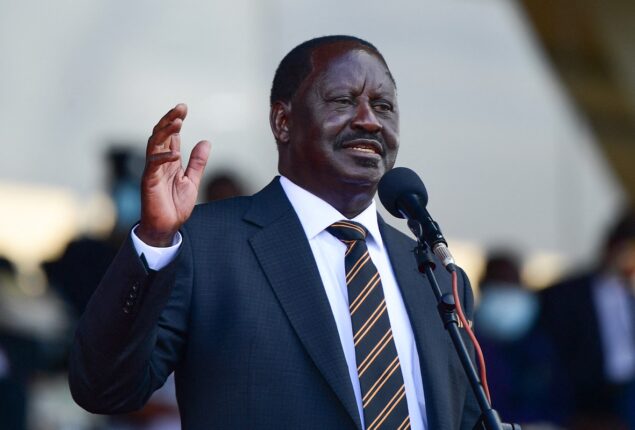William Ruto wins presidential poll in Kenya elections
William Ruto narrowly beats his rival Raila Odinga, taking 50.4% of the...

Introducing Kenya’s newly elect president William Ruto
Who will be in charge of east Africa’s biggest economy now that William Ruto has won a tense and intensely contested race for the presidency of Kenya?
As a youngster, Ruto grew up on his family’s farm in a peaceful community in the Rift Valley, selling chickens from a roadside kiosk to generate money. He drew on these roots during his presidential campaign, portraying himself as a “hustler” Kenyan who had overcome poverty to enter the nation’s political elite.
Ruto, who has held the position of vice president since 2013, defeated Raila Odinga, a seasoned politician, in a shock victory.
Since Kenya’s independence was proclaimed, the 55-year-old will be the country’s fifth president. Additionally, his coalition’s party, Kenya Kwanza (Kenya First), has gained the majority of seats in Kenya’s Senate, the country’s upper house of parliament.
Ruto’s introduction to politics came through church leadership at the University of Nairobi, where he met and supported former president Daniel Arap Moi during the 1992 elections.
“He (Moi) identified me from the university where I was a worship leader and took interest in me. He introduced me to politics, groomed me and inculcated in me the culture of servant leadership,” Ruto remarked in April, according to a report in local media.
In the 1990s, Ruto, who received a doctorate in plant ecology after majoring in botany and zoology in college, began to concentrate more on politics. He took a chance and entered the 1997 election for the Eldoret North constituency, which he ultimately won. As a result of his ascent through the ranks, he won re-election to the parliament in 2002.
After being cleared of corruption charges in 2011, he was convicted at the International Criminal Court in 2013 together with then-President Kenyatta on charges of crimes against humanity for inciting ethnic unrest after the 2007 elections. The charges were later dropped, though.
In his victory address on Monday, Ruto said, “There were predictions that we won’t get here, but … we are here.”
The devoutly religious father of six used the occasion to quote Scripture and give thanks to God. Ruto, who chaired the Christian Union during his college years, continued, “I want to confess that I have been prayed into victory.”
Ruto refers to his supporters as “hustlers” and himself as the “hustler-in-chief.”
He has pledged to abolish the “dynasties,” such as the Odinga and Kenyatta In 1963, Jomo Kenyatta, the father of current President Uhuru Kenyatta, served as the nation’s first president. Odinga’s father was a previous vice president.
Former prime minister and opposition figure Odinga has attempted to win the presidency five times over the course of 25 years. He has declared that this is his last competition.
a bloody conflict.
The final struggle between the once-enemies-now-allies-now-foes was a terrible one.
Four out of the seven members of the electoral commission contested chairman Wafula Chebukati’s results, calling them “opaque,” and the results were delayed for several hours.
Odinga’s coalition contested the results before they were even declared, but Ruto was subsequently announced winner with 50.49% of the vote. In a later statement, Odinga reiterated his position, claiming that his coalition believes that “neither a legally and validly declared winner nor a president-elect” exists.
Ruto overcame a number of obstacles to become Kenya’s top official. He first announced in 2006 that he would run for president, but his party did not nominate him. He announced his candidacy for president once more in 2013. However, he put that desire on hold and teamed up with Kenyatta to create the Jubilee Party, running alongside him on an united ticket.
They won that election and were inaugurated as president and vice president in April 2013 for a five-year tenure.
Ruto lost much of his authority and duties after the two fell out in 2018, however he kept his position as Kenya’s deputy president. Instead of supporting him for president, Kenyatta supported Odinga.
Ruto will face pressure to offer solutions to Kenya’s urgent economic issues, like as mounting debt, high food and fuel prices, and widespread youth unemployment. His victory has not been a resounding mandate.
According to the most recent preliminary figures from the Independent Electoral and Boundaries Commission, many disenchanted voters remained away from the polls with turnout at 64.6% of the registered voters, down from 79.51% in the 2017 elections.
Kenyans, according to analyst Moses Odhiambo, only believed that the two front-runners represented more of the same.According to Odhiambo, “among the front runners are trying to strike a balance between what is viewed as continuity and freshness within a continuity.”.
“Ruto is the deputy president and part of the current government. There’s a perception that Odinga could be an extension of the current president because of the support the president has given him.”
Catch all the World News, Breaking News Event and Latest News Updates on The BOL News
Download The BOL News App to get the Daily News Update & Follow us on Google News.